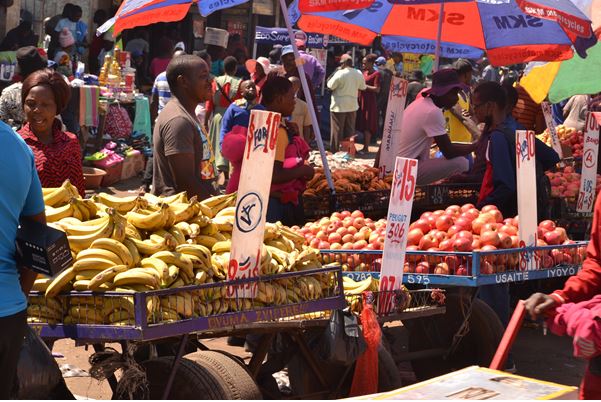Embracing equity and dismantling power imbalances in African food systems
Besides focusing on climate change, development organizations, private sector players and governments are increasingly being compelled to embrace equity, inclusion, decolonization of knowledge and dismantling of power imbalances. This new narrative is beginning to shape new development pathways including African food systems and upholding indigenous ways of knowing.

Questioning the notion of inclusion in food systems
What does inclusion mean when policy makers do not see anything wrong with supporting a few exotic food commodities at the expense of diverse local food commodities on which the majority depend for a living and food? These kinds of questions are beginning to be asked loudly. Citizens are gaining the courage to question the wisdom of government ignoring mass food markets that give income to the majority of food producers and food to low-income-consumers.
Some of the double standards that are overdue for dismantling are still dominant in Africa’s food processing industry and related monopolies. African countries such as Kenya and Zimbabwe have long identified small and medium food processing enterprises as key drivers of rural development anchored on inclusive food systems. However, a huge barrier for these small enterprises are big food processing countries with deep colonial roots and inherited financial advantages.
High levels of concentration and oligopolistic tentacles have seen big food processing companies pushing out small enterprises from most value chains for decades. Although their capacity to create meaningful employment has reached its limit, large-scale companies rooted in colonial advantages, continue to dominate the milling, beer brewing, industrial chicken & egg production, meat processing, the fish industry and many others. The same fate befalls fruit processing and promotion of indigenous chickens into mainstream value chains.
A case for dismantling structural inequalities
The negative impact of structural inequalities in Africa’s food systems may not be visible to those who benefit from such systems such as coopted politicians and financial institutions that continue to support these companies. Unless such inequalities are addressed, most African countries will not be able to unlock the full value of their diverse agricultural value chains and food systems including marginalized commodities like small grains and diverse indigenous vegetables. That is why it is critical to constantly examine the food processing sector especially in countries where SMEs are now building a strong foundation for a new home-grown economy.
In much of Southern Africa, massive processing firms have banded together with retail and wholesale chains to extend their presence and influence into rural and township markets that provide shelter for smaller food processors and shorter value chains. This is killing small enterprises that are part of the local food systems. There are communities that have been depending on home-brewed beer as a source of income but these have been disrupted by big processing companies from cities who ship their industrially-brewed beer to rural areas. Monopolies that are mushrooming in potatoes, beef, broiler chickens, milling and many value chains cannot be ignored because doing is paying lip service to equity and economic justice.
Farmers can be given inputs to produce grains and chickens but if broader structural inequalities among players in the food system are not dismantled, small enterprises will not find any avenue for growth. Lack of high-powered networks and insider knowledge often prevent small enterprises from capitalizing on opportunities available to better-connected large firms most of whose relationships with banks and politicians date back to colonial times. This is visible in how most efforts to nurture small rural enterprises have failed in most countries. Solving these issues will require a more coordinated approach to industrial policy with an equity and economic justice lens.
Winds of change
Equity and inclusivity-oriented business scrutiny is gaining traction in the USA where serious efforts are being made to ensure socio-economic sectors and businesses are as inclusive as possible. For instance, as part of the broader movement toward racial equity that received global attention in 2020, many USA retailers have embarked on a journey to make their shelves more diverse and inclusive. For instance, top retailers have pledged billions of dollars in support of diverse suppliers and minority- and women-owned businesses.
If this were to happen in an African country, imagine a retail food chain that has always been exclusive in terms of where it sources its food accepting commodities from smallholder farmers in a rural corner of a country. Rather than stocking eggs from one colonial company, a supermarket would be seen stocking eggs from small scale egg producers including those producing eggs from indigenous poultry. If it is not a colonial mindset by some supermarkets, what currently prevents them from stocking indigenous chickens in their shelves?
Assuming what is happening in USA spreads to developing countries, food companies, retailers and supermarkets in developing countries should start to ditch old ways of working and be more inclusive not just from a customer base perspective but also from a food product range angle. This will enable local communities to brand their commodities and sell through supermarkets, the same way some companies sell through the franchising model through retail chains and supermarkets. Consumer demands for inclusivity are slowly getting louder in Africa and those who ignore such voices will soon be out of business. More than half of the people in agriculture and food-related work need to pay attention to this transition if they are to move with the changing times.
charles@knowledgetransafrica.com / charles@emkambo.co.zw / info@knowledgetransafrica.com
Website: www.emkambo.co.zw / www.knowledgetransafrica.com
